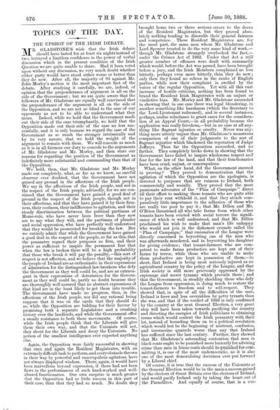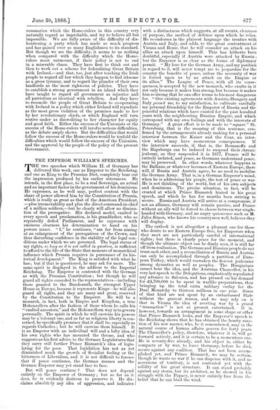TOPICS OF THE DAY.
THE UPSHOT OF THE IRISH DEBATE.
AIR. GLADSTONE'S wish that the Irish debate should have lasted for at least six nights instead of two, betrayed a limitless confidence in the power of verbal discussion which in the present condition of the Irish Question we are quite unable to share. Had it been voted upon without any discussion, we very much doubt whether either party would have stood either worse or better than they do now. After all, the majority of 93 against Mr. John lliforley's motion is the most important fact of the debate. After studying it carefully, we are, indeed, of opinion that the preponderance of argument is all on the side of the Government ; but we are quite aware that the followers of Mr. Gladstone are equally well convinced that the preponderance of the argument is all on the side of the Opposition, and we are not so blind to the case of our opponents as not to be able to understand what they mean. Indeed, while we hold that the Government made out their side of the case triumphantly, we hold that the Opposition made out their side of the case no less suc- cessfully, and it is only because we regard the case of the Government as so much the stronger intrinsically and by its very nature, that we hold the weight of the argument to remain with them. We will concede as much as it is in all fairness our duty to concede to the arguments of Mr. Gladstone and Mr. Morley, and then state our reasons for regarding the position of the Government as indefinitely more substantial and commanding than that of the Opposition. We hold, then, that Mr. Gladstone and Mr. Morley made out completely, what, so far as we know, no careful observer ever doubted, that the Government have not gained any ground in the affections of the Irish people. We say in the affections of the Irish people, and not in the respect of the Irish people, advisedly, for we are con- vinced that the Government have gained a good deal of ground in the respect of the Irish people, though not in their affections, and that they have gained it by their firm- ness, their coolness, their indifference to agitation, and their steady discrimination between the political partisans of Home-rule, who have never been freer than they now are to say what they will, and the partisans of plunder and social oppression, who have perfectly well understood that they would be prosecuted for breaking the law. But we entirely admit that while the Government have gained a good deal in the respect of the people, so far as this, that the peasantry regard their purposes as firm, and their power as sufficient to inspire the permanent fear that when the law is broken there will be a high probability that those who break it will pay the penalty,—this sort of respect is not affection, and we believe that the majority of the people of Ireland are as enthusiastic in their expressions of admiration for the distinguished law-breakers who defy the Government as they well could be, and are as extrava- gant in their expressions of detestation for the Govern- ment as they well could be, partly no doubt because they are thoroughly well assured that no abstract expressions of that kind are in the least likely to get them into trouble. The Government have made no progress, then, in the affections of the Irish people, nor did any rational being suppose that it was on the cards that they should do so, while the Opposition are bidding for their favour by promising both a separate Legislature and a crushing victory over the landlords, and while the Government offer a steady resistance to both these movements. Of course, while the Irish people think that the Liberals will give them their own way, and that the Unionists will not, they shout for the Liberals and decry the Unionists. No person of the smallest intelligence ever expected anything else.
Again, the Opposition were fairly successful in showing that once and again the Resident Magistrates, with an extremely difficult task to perform, and every obstacle thrown in their way by powerful and unscrupulous agitators, have not always displayed wisdom. There, again, it would have been marvellous beyond expression, if there had not been flaws in the performances of such hard-worked and well- abused functionaries. Our own surprise is much greater that the Opposition had so little success in this part of their case, than that they had so much. No doubt they brought home two or three serious errors to the doors of the Resident Magistrates, but they proved abso- lutely nothing tending to discredit their general fairness and competence. These Resident Magistrates are, for the most part, the same men whom Mr. Gladstone and Lord Spencer trusted to do the very same kind of work,— though Mr. Gladstone strangely overlooked the fact,— under the Crimes Act of 1882. Under that Act a stilt greater number of offences were dealt with summarily which would, before the Act was passed, have been brought before a jury, and the Irish Members complained no less bitterly, perhaps even more bitterly, than they do now ;• only then they found no echoes in the ranks of English parties, while now their complaint is swelled by the voices of the regular Opposition. Yet with all this vast increase of hostile criticism, nothing has been found to- brand the Resident Irish Magistrates with an unjust or vindictive bias. Mr. Morley and Mr. Gladstone succeeded in showing that in one case there was legal blundering, in another something like harshness (which the Secretary to the Lord-Lieutenant redressed), and in several instances,. perhaps, undue reluctance to grant cases for the considera- tion of an Appeal Court,—in all probability because the application was really frivolous,—but in no case at all any- thing like flagrant injustice or cruelty. Never was any- thing more utterly unjust than Mr. Gladstone's monstrous comparison of one of their judgments to the sort of flagrant injustice which blackened the reputation of Judge Jeffreys. Thus far the Opposition succeeded, and no farther. They completely broke down in showing that the Government have failed to inspire wholesome respect and fear for the law of the land, and that their functionaries have been cruel, unjust, or unscrupulous.
What, on the other hand, did the Government succeed in proving ? They proved to demonstration that the agitation of which the Opposition are the apologists, is directed to purposes that are ruinous to Ireland, both commercially and socially. They proved that the most passionate advocates of the "Plan of Campaign" direct all their effort to making those tenants who are quite able to pay their rent withhold it, and that they attach com- paratively little importance to the adhesion of those who are really too poor to pay it ; that Mr. Dillon and Mr. O'Brien threatened all who take farms from which other tenants have been evicted with social terrors the signifi- cance of which is well understood, and that Mr. Dillon proclaimed his wish to make that man's life unhappy who would not join in the dishonest crusade called the "Plan of Campaign ;" that emissaries of the League were directly concerned in boycotting one of the men who. was afterwards murdered, and in boycotting his daughter for giving evidence ; that tenant-farmers who are com- petent to make farms productive are kept out of their farms by terror, while those who are unable to make them productive are kept in possession of them,—in short, that Ireland is being most seriously injured as an agricultural country by the policy of the League, and that Irish society is still more grievously oppressed by the espionage and secret tyranny which prevails there ; and that the Government, in steadily shielding those who defy the League from oppression, is doing much to restore the tenant-farmers to freedom and to self-respect. They showed that, in spite of all the difficulties of the case, Ireland is freer and less overridden by petty tyrants than she was, and that if the verdict of 1886 is only confirmed_ by the country at the next General -Election, a very great step will have been taken towards pacifying the country and directing the energies of Irish politicians to obtaining terms which would content the Irish peasantry with their lot, instead of hounding them on to a political revolution which would but be the beginning of mistrust, confusion, and internecine quarrels worse than any that Ireland has suffered since the last century. Further, they showed that Mr. Gladstone's astounding contention that men in black coats ought to be punished more leniently for advising crime than men in frieze coats should be punished for com- mitting it, is one of the most undemocratic, as it is also one of the most demoralising doctrines ever put forward by a Liberal chief. Of course, it is true that the success of the Unionists at the General Election would be in the main a success gained by the electors of Great Britain over the electors of Ireland, and would pacify Ireland only by taking the heart out of the Parn.ellites. And equally of course, that is a con- summation which the Home-rulers in this country very naturally regard as improbable, and try to believe all but impossible. We are fully aware of the difficulty of dis- heartening a party which has made so much progress and has gained over so many Englishmen to its standard. But though we see the difficulty, it seems to us nothing when compared with the difficulty which the Home- rulers must surmount, if their policy is not to end in a miserable chaos. They have first to think out and then to work out a scheme for federalising Great Britain with Ireland,—and that, too, just after teaching the Irish people to regard all law which they happen to find irksome as a gross tyranny, and to regard the plunder of their own landlords as the most righteous of policies. They have to establish a strong government in an island which they have taught to regard all government as injustice and all patriotism as identical with rebellion. And they have to reconcile the people of Great Britain to co-operating with Ireland in a policy which either Ireland will repudiate as the most gross violation of the promises made to her by her revolutionary chiefs, or which England will turn restive under as discrediting to her character for equity and good faith. Either the success of the Unionists or the success of the Home-rulers will involve serious difficulties, as the debate amply shows. But the difficulties that would follow the success of the Home-rulers would be tenfold the difficulties which would follow the success of the Unionists, and the approval by the people of the policy of the present Government.



















































 Previous page
Previous page